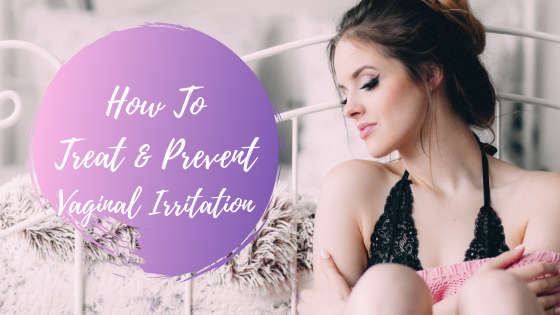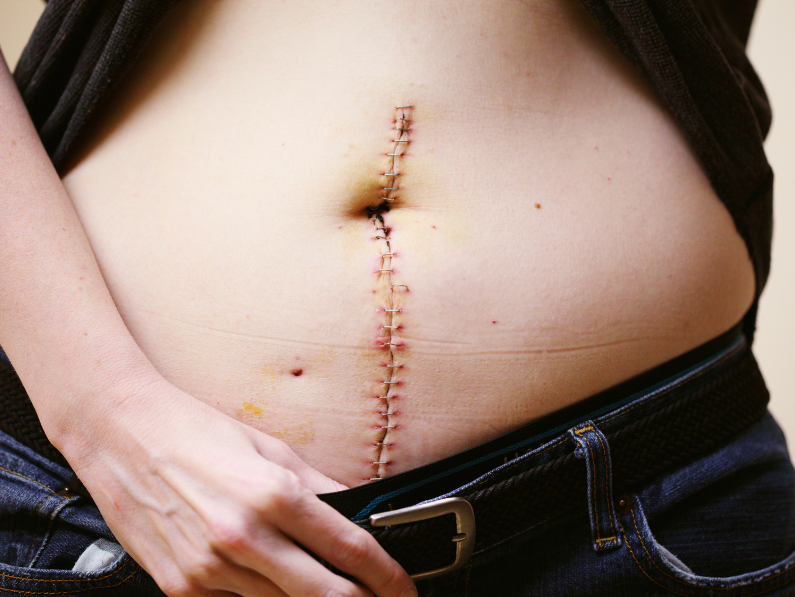It’s time to discuss another awkward yet common feminine health issue known as vaginal itching. As with many feminine health issues the private nature of vaginal itching causes many women to shy away from talking about it due to shame or disgust. But, there’s no reason to feel that way. It’s something that we’ve all dealt with at some point and time. Having more honest discussions about what causes vaginal itching to occur may increase proper diagnosis and treatment.
Page Contents
What Causes Vaginal Itching?
So, to begin with, you need to understand what causes this bothersome symptom to occur in the first place. Indeed there are four underlying issues which lead to vaginal itching and irritation disrupting your vaginal health.

Vaginal Infections
The first and most common issue associated with vaginal itching is having a vaginal infection such as a yeast infection or bacterial infection. Both of these vaginal infections cause disruptions in the delicate vaginal flora which lead to imbalanced vaginal pH. Vaginal pH imbalance can contribute to either overproduction of candida (yeast) or overgrowth of bad bacteria.
In the case of excess yeast, this usually causes a yeast infection to develop. In addition to vaginal itching and irritation, other symptoms related to yeast infections include:
- Burning sensation while urinating
- Pain and soreness on the vulva (the external part of the vagina)
- Redness and swelling of the vulva
- Thick, white cottage cheese-like discharge
On the other hand, bacterial infections deal with the overgrowth of bad bacteria in the vagina. This leads to itching and irritation as well as:
- Pain or burning while urinating
- White or gray vaginal discharge
- Foul or fishy-smelling discharge/odor
If you are experiencing symptoms indicating you have a yeast infection or a bacterial infection it’s important to schedule an appointment with your OB/GYN. Not only are they able to properly diagnose what’s causing your symptoms but they will also be able to prescribe an appropriate treatment to help you get relief.

Vaginal Irritants
If you use products that contain harsh chemical ingredients such as fragrance, dyes, spermicides, or preservatives; this may cause vaginal irritation and itching. These ingredients upset the vaginal flora and lead to pH imbalances. Additionally, they contribute to increased vaginal dryness which can lead to irritation and itching. Common products that contain chemical irritants are:
- Scented Tampons and Pads
- Douches and vaginal suppositories
- Feminine sprays, powders, and washes
- Condoms, spermicide, lubricants
Menopause
During this change, estrogen begins to decline. This hormonal shift causes disturbances to occur within your body that lead to a variety of issues such as vaginal dryness and vaginal itching.
Sexually Transmitted Infections
Contracting a sexually transmitted infection (STI) may lead to issues with vaginal itching. While this isn’t always the case since vaginal itching and irritation is a common symptom for a variety of other issues. It can be an early indicator of an STI. You are at a high risk of contracting an STI if you engage in unprotected sexual activity. Experiencing vaginal itching in combination with yellow/green discharge, painful intercourse, abnormal bleeding or rashes/sores on the genitals are symptoms to have your doctor evaluate and diagnose.

How to Treat Vaginal Itching
First and foremost, if you are experiencing issues with vaginal itching you should seek the advice of your doctor for proper diagnosis. Guessing or following at-home remedies when you don’t know what the underlying cause is could make matters worse. After obtaining a proper diagnosis you should follow your doctor’s orders and take any prescribed medication. The type of treatment you receive will depend on what’s causing your vaginal itching.
Treating Yeast Infections
If the underlying cause of your vaginal itching is a yeast infection your doctor may prescribe an antifungal medication or cream for you to take. These anti-fungal medications are commonly found in drugstores and if you’ve experienced a yeast infection before and your doctor indicates it’s ok you should be able to treat your yeast infection with these medications. But, if the problem persists beyond a week or becomes worse you should follow up with your doctor.
Treating Bacterial Infections
When you are concerned that you have a bacterial infection visiting with your doctor is your priority. Your doctor will be able to properly diagnose if you indeed have a bacterial infection and prescribe an antibiotic medication. These antibiotics work to destroy the bacteria causing your vaginal infection. Additionally, to killing and wiping out the harmful bacteria these antibiotics also destroy the good bacteria. This may leave you susceptible to a yeast infection and further pH imbalances. So, after you finish your round of antibiotics make sure you take a high-quality probiotic supplement and consume probiotic-rich foods to aid in rebuilding a healthy vaginal flora.
Treating Menopause Related Vaginal Itching
Experiencing vaginal irritation related to hormonal imbalance requires an entirely different approach. Instead of anti-fungal or antibiotic medications the focus is balancing out hormones and replenishing lost moisture. Integrating home remedies with medical treatments can provide well-rounded results. You can begin by using a vaginal moisturizer to replenish lost moisture to the vaginal area. This will help with itching caused by vaginal dryness.
Additionally, you can use over the counter medicated itch creams or cooling towels to help with soothing the area and decreasing discomfort. Just make sure to use as indicated on the package and use the product on the external vaginal area only.
Medications and treatments that your doctor may suggest include hormone replacement therapy (HRT). This will help balance out the hormones and increase estrogen levels which may help with decreasing itching, irritation, and dryness. These hormone treatments come in various forms such as creams, tablets, vaginal ring inserts, or pellets. Your current lifestyle and overall health will determine if this treatment option is the right one for you.
Addressing Sexually Transmitted Infections
If you suspect that your vaginal itching is due in part to a sexually transmitted infection seek medical attention immediately. Do not try and treat using home remedies since this will not treat the infection and may increase the spread of the infection to other reproductive organs within the pelvis. Delaying treatment of an STI may lead to complications such as Pelvic Inflammatory Disease (PID). This is when the infection spreads to the uterus, ovaries, and fallopian tubes. If it is left unchecked it can cause scarring and adhesions to develop and may impair your fertility.
Visiting with your OB/GYN will allow you to achieve proper diagnosis and proper treatment. This enables the body to heal properly while preventing undesirable complications.
Protect Your Vaginal Health
The gist of what I’m hoping to get across to you is that vaginal itching while unpleasant and awkward isn’t something you should try to “fix” or “treat” yourself. Working with a medical professional to determine the underlying cause is always the best remedy. While there is nothing inherently wrong with natural and holistic therapies that are used to improve vaginal health and well-being they should be used as preventative measures and not treatment measures. Allowing an issue such as vaginal itching to go unchecked can lead to further complications and issues.
About the Author.

Hi, my name is Kathleen but you can call me Kat. I’m a health and wellness professional turned freelance writer and content creator. My personal struggle with infertility, endometriosis and ovarian cysts made me realize that there just isn’t enough information out there available to women to help them learn more about PCOS, endometriosis, adenomyosis, or fibroids. Basically there’s a serious lack of information concerning a variety of women’s health topics and issues and well I got fed up. I decided to be the change and created this blog in an effort to spread awareness and advocate for women’s health issues. It has now become my passion to educate and empower women to redefine their health and be their own advocate. You can find me on YouTube and Instagram. If you take the opportunity to visit me on my other platforms don’t hesitate to leave a message, I would love to hear from you!






